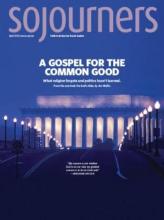OVER THE PAST few years, we have seen tangible proof that creation is terribly off balance. Global warming is causing droughts and heat waves around the world and is making hurricanes more powerful. In my hometown of New York City, we have experienced the effects of severe weather: Hurricane Irene in 2011 and, most recently, the devastation of Hurricane Sandy. Sandy was an eye-opening demonstration that climate change is a poverty issue, a race issue, and an immigration issue.
Though neighborhoods of all socioeconomic statuses were affected by Sandy, poorer communities are taking longer to recover. Many of them were without electricity, heat, and water longer than were more affluent communities. For instance, residents of Red Hook's public housing projects in Brooklyn were without power and water for two weeks after the storm. My cousin Dabriah Alston, a Red Hook resident, told me that the city ignored residents' repeated requests for information about when the heat would come back on: "The bottom line is, they don't care about us. Projects are filled with poor folk, and as we all know, the poor are seldom a priority."
Hurricane Sandy shone an uncomfortable light on racial and economic disparity in New York City. As someone who was born and raised in Brooklyn, I am very familiar with Red Hook's history of poverty, and the neglect by local government. For example, only when the community near the housing projects began to gentrify did the city start to repair the nearby subway station.
Sandy also exposed how, in the city that is home to Ellis Island, immigrants live in an environment of fear. Although families of mixed immigration status qualify for some FEMA disaster assistance, and families of any status qualify for emergency food aid, many did not apply for it because they feared deportation, as I learned at a post-Sandy meeting of the Occupy Faith group. The environment of fear magnified the impact that the hurricane had already had on the poor: Many immigrants are non-salaried workers who missed a week of their already-low wages due to the hurricane.
Read the Full Article
